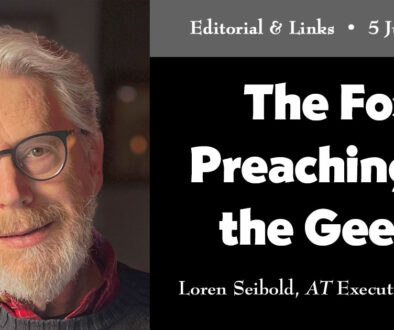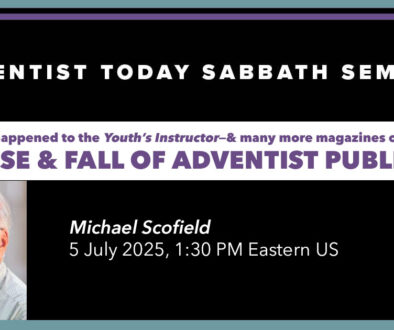Fundamentalism and the Rise of “Muscular Adventism”
11 August 2021 |
Muscular Adventism, by Michael W. Campbell
While attending some recent scholarly meetings, I was standing in line to visit the book exhibit. In front of me was a renowned Old Testament scholar whom I readily recognized. After I complimented him, telling him that I enjoyed his books and noting a relative who had taken some of his classes, he asked me about my background. I told him I was Seventh-day Adventist. “Oh,” he replied, “you belong to the denomination that was founded by a woman but is against women’s ordination.” The irony to an outsider was obvious.
So how did we get to the point where the Adventist denomination, a movement founded during the midst of the Second Great Awakening with an incredible awareness and involvement of women, shifted by the twentieth century to where women were largely elided from Adventist consciousness?
A significant part of this story pertains to the rise of Fundamentalism—a conservative, reactionary pulse to the modernist/liberalist pulses within Christianity. This Fundamentalist consciousness is best understood as a worldview or outlook that was largely reactionary in nature. Fundamentalists were best defined by what they were against: evolution, the historical-critical treatment of the Bible, doubts about the validity of miracles or the efficacy of the atonement. All of these and more were part of a large-scale reaction that during World War I took on military overtones. A true Fundamentalist was someone who must fight to defend the faith.
Fundamentalism also had a sordid underbelly that contributed to significant reversals when it came to social activism. The liberal Social Gospel movement was something that they were against, and many conservative Christians who had been quite progressive in terms of a wide variety of reforms now shifted away. Some of these earlier reforms included the abolitionist cause and a progressive embrace of women in the church. Yet, in the early twentieth century, the Fundamentalists would become particularly well-known for embracing white, male patriarchy. The White Anglo-Saxon Protestant (WASP) was a part of this identity now besieged.
Of note is the rise of “muscular Christianity” that reified roles for women. Historian Clifford Putney defines muscular Christianity “as a Christian commitment to health and manliness.” The term, which originally came from Thomas Hughes (Tom Brown’s School Days) and Charles Kingsley (Westward Ho!), signified how the Christian Church had become too soft and effeminate, particularly during the Victorian Era. The supposed virtue and ethics of Victorian Christian gentlemen were replete with notions of masculinity and honor. Such notions of patriarchy shapeshifted with a new generation during World War I through the 1920s. The fusion of specific gender roles became pervasive, especially within Fundamentalist Adventism, during this same time period. Adventist authors, like their Fundamentalist counterparts, cultivated a whole genre of new literature to help Adventists elevate male roles at the expense of women.
This sentimentality can be seen in numerous publications by Adventist authors during the 1920s, which will be illustrated during this special Adventist Today presentation. One poignant example was a 1920 article by Daniel H. Kress, an Adventist physician, who wrote in the Signs of the Times about “The Passing of the Man.” This article, graphically illustrated with women peeking up and around the frontispiece, expresses concern about how “old men” were being replaced by “young men” and thereby relegated to the “scrap heap.” The implication was clear: during the ratification of the 19th Amendment guaranteeing women the right to vote, women were eclipsing men. Such arguments must be seen amidst the backdrop of the survival of the fittest. Women who asserted themselves beyond traditional Victorian notions of femininity were considered to be part of liberal Christianity, which included the heresy of evolution. In other words, a good Adventist woman during this time was to remain at home and raise children. It is worthwhile to observe that this prescriptive behavior was not uniform among all Adventists (some supported the 19th Amendment, for example), yet even as women along the larger American population obtained the right to vote, it caused concern about just how far this trend would go. Kress provocatively queried: “Is business to be dominated by the woman twenty-five years [from] now?” Ironically, despite the passage of the 19th Amendment, women were not in any danger of taking over either the business world or the church. In fact, it would be quite the opposite.
Today we take a journey looking at the impact of Fundamentalism, and, specifically, the muscular Christianity movement, and how these have had a profound impact upon Adventist identity, especially in terms of gender. As Adventism during this time became increasingly Fundamentalist, creating its own form of Adventist Fundamentalism, it adapted the muscular Christianity movement into its own unique variety of “muscular Adventism.”
Teacher:
Michael W. Campbell, Ph.D., is professor of systematic theology and religious history at Southwestern Adventist University where he has taught the past three years. He is an ordained Seventh-day Adventist minister and served for 5½ years as a missionary, training pastors at the Adventist International Institute of Advanced Studies in the Philippines (AIIAS). He has published numerous popular and peer-reviewed journal articles about theology and religious history. He served as assistant editor of The Ellen G. White Encyclopedia (Review and Herald, 2013) and editor of The Journal of Asia Adventist Seminary (2015-2018). He is co-editor of the forthcoming Oxford Handbook of Seventh-day Adventism. His most recent book is a Pocket Dictionary for Understanding Adventism (Pacific Press, 2020). Some of his other recent books include 1919: The Untold Story of Adventism’s Struggle with Fundamentalism (2019) and The Ellen White Pocket Dictionary (2018), and he is currently under contract to write a textbook on Adventist history with Eerdmans. He co-hosts the “Sabbath School Rescue” and “Adventist Pilgrimage” podcasts. He is married to Heidi, who is a Ph.D. student in Early Modern History at Baylor University. They have two children, Emma (age 14) and David (age 12). Together they enjoy camping, gardening, bird watching, and Pathfinders.
Moderator:
Dr. Raj Attiken is an adjunct professor of religion at Kettering College, the Adventist higher education institution in Dayton, Ohio, and former president of the Ohio Conference.
How to join:
This event is over. You can listen to the presentation here.
When:
ATSS starting time depends on where you are. If you’re on the west coast of the United States, it’ll be 10:30 AM. On the east coast, 1:30 PM.
Times around the world:
- Reykjavík: 5:30 PM
- College Place: 10:30 AM
- Lincoln: 12:30 PM
- Denver: 11:30 AM
- Bracknell: 6:30 PM
- Loma Linda: 10:30 AM
- Nairobi: 8:30 PM
- Gackle: 12:30 PM
- Hosur: 11:00 PM
- Waco: 12:30 PM
- Tulsa: 12:30 PM
- Helsinki: 8:30 PM
- Stockholm: 7:30 PM
- Hamburg: 7:30 PM
- Capetown: 7:30 PM
- Madrid: 7:30 PM
- Paris: 7:30 PM
- Honolulu: 7:30 AM
- Cooranbong: 3:30 AM (Sunday)
The class is intended to last about 2 hours, though the conversation often continues to 4 PM.
About our class:
- The AT Sabbath Seminar is intended to be a courteous forum. We discuss and ask questions politely. We don’t accuse, get angry, or put people down.
- Make your comments and questions short—don’t dominate.
- Keep your microphones muted unless you are called upon to make your comment or ask your question.
- Indicate your interest in speaking by raising your electronic hand—under the “reactions” button.
- Those who make accusations or unkind statements will be muted or removed.
- Please use your name when you sign in! Not your phone number, not your initials. This will help us differentiate you from unwelcome guests who want to disrupt us. You can set your name after signing on by clicking on the 3 dots next to your picture, which drops down a menu.
- If it should happen that we are attacked so that we have to stop the meeting, we’ll quickly post a new meeting link on our AT Facebook page.
We look forward to getting acquainted with you!
Coming up:
- Steven Chavez on the Holy Spirit – 8/21
- Jim Walters – 8/28
- Stanley Patterson on organizational evolution
- Julius Nam
- Denis Fortin on Ecumenism




